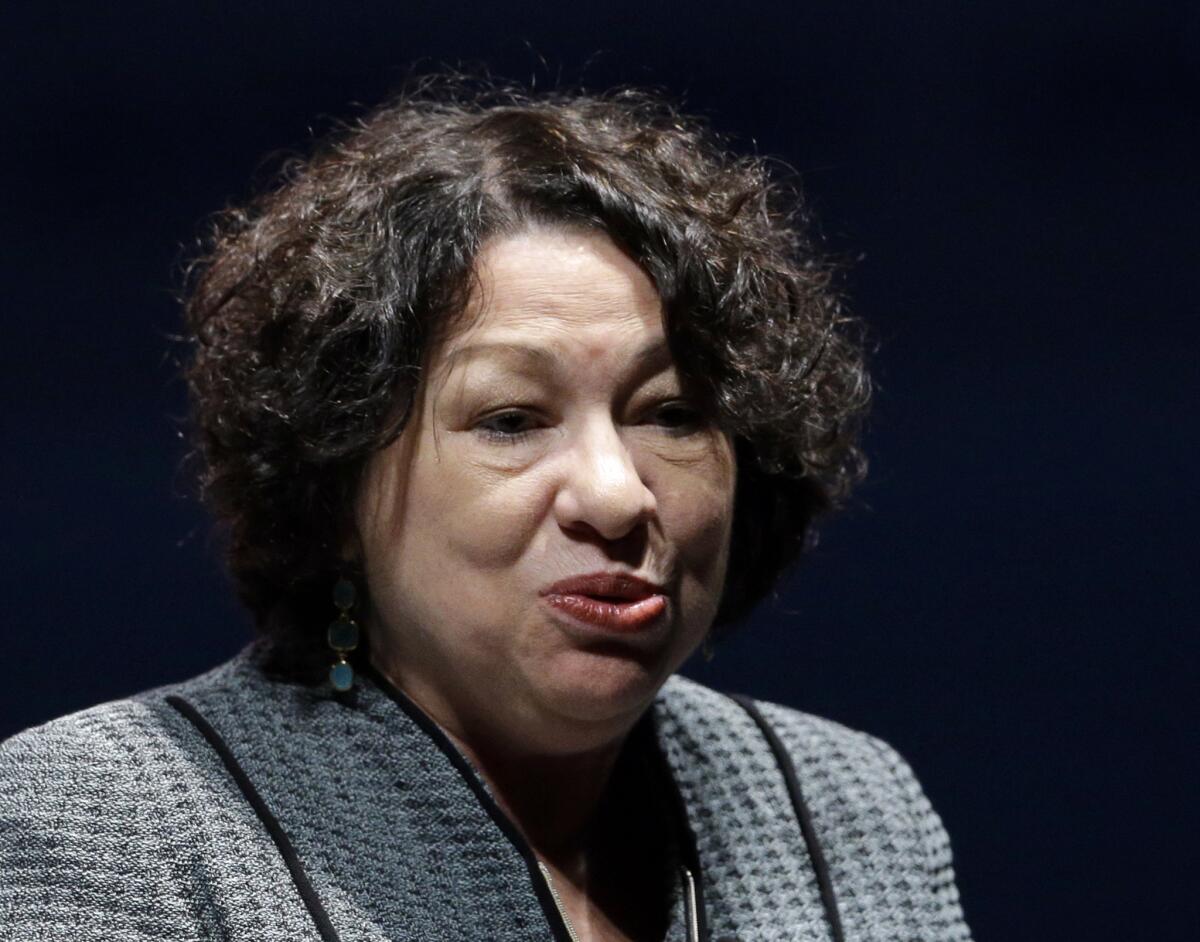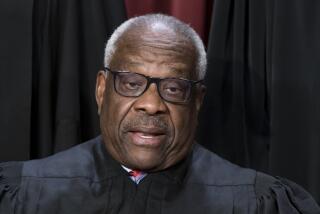Becoming a Supreme Court justice was a shock, Sotomayor says

- Share via
Reporting from Washington — Moving to Washington and becoming a Supreme Court justice five years ago was shocking, “like somebody throwing cold water on me,” says Justice Sonia Sotomayor.
The transition from being a little known appeals court judge in her hometown of New York to being an easily recognized Washington personality was extremely difficult, Sotomayor said.
“People stop treating you like a person,” she said. “It’s hard for someone like me who really likes people and wants to have living room conversations that are not posted on Twitter.”
Her comments came in a wide-ranging and, for a Supreme Court justice, unusually candid conversation about her life during the annual convention of the American Constitution Society, a liberal lawyers group, Thursday evening.
Despite her avowed reticence, Sotomayor has quickly become one of the court’s best known public figures. She pops up regularly in the trendy downtown Washington neighborhood that she has embraced as her new home, makes numerous public appearances – even officiating over New Year’s Eve revelry at Times Square – and last year published an autobiography that chronicled her life as a child in a housing project in the Bronx.
She has become a role model for poor Latinos and other minorities, frequently appearing at meetings with low-income teenagers as a living reminder that someone from humble beginnings can make it to the top.
In recent months, she has also become one of the Supreme Court’s most outspoken liberal voices, crying out, for example, in an impassioned 58-page dissent from a decision upholding Michigan’s prohibition on affirmative action in college admissions.
Thursday night, however, she was just “Sonia,” having a very public living room conversation with an old friend, Bronx neighbor and high school classmate Ted Shaw, a professor at Columbia University and longtime civil rights lawyer.
It was because of her sensation of being “in this public fish bowl” that she had decided to retreat over the past three summers, spending time poring over her memories so that she could “step back into what I had just left” and detach herself from “the great weight” that had suddenly been thrust upon her, she said.
Prodded by Shaw, Sotomayor replayed her life growing up in poverty in the Bronx, one now familiar to readers of “My Beloved World,” which reviewers hailed as beautifully written (with the help of a friend who is a poet). The book became a bestseller.
Going to Catholic schools in the Bronx was like being sent to a different world, Sotomayor and Shaw said. Most of the students were white (Shaw is African American), and both said they would not have considered inviting friends home to see the poverty in which they lived.
Sotomayor told a familiar story of how the television show “Perry Mason,” about a defense lawyer who unfailingly won cases by pulling a rabbit out of his hat during trials, inspired her to become a lawyer. But she said it was not Mason she was impressed with as much as the judge.
“Perry did all the work, but the guy who made the final decision was the judge. And I decided, I wanted to be that guy,” she said.
She said she became a lawyer “at the tail end” of the civil rights movement “with a growing sense of the role of law in human relations,” watching how “our equality” was shaped by the rule of law and wanting to be a part of it.
“I’m pretty naive,” she said with emotion. “Even to this day, I believe.”
The closest the conversation came to controversy was when Shaw brought up her affirmative action dissent. Conservatives had criticized what she wrote as proof of what her opponents said during her confirmation hearings – that she would be unable to differentiate between her life experiences and the law.
“It’s easy when precedent supports you,” Sotomayor quipped, referring to earlier Supreme Court decisions upholding affirmative action.
Shaw, in a veiled reference to Justice Clarence Thomas, a vociferous opponent of affirmative action who grew up in poverty matching Sotomayor’s, wondered aloud how other justices could separate themselves from their life experiences.
“You know I can’t comment on that,” Sotomayor responded.
For more news on legal affairs and the Justice Department, follow me on Twitter @TimPhelpsLAT
More to Read
Sign up for Essential California
The most important California stories and recommendations in your inbox every morning.
You may occasionally receive promotional content from the Los Angeles Times.











